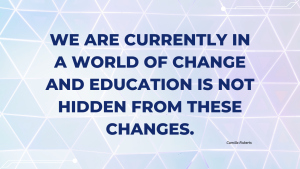Championing Academic Integrity in the Age of AI: The International Day of Action for Academic Integrity
Published by: WCET | 10/18/2023
Tags: Academic Integrity, Digital Learning, Professional Development, Student Success
Published by: WCET | 10/18/2023
Tags: Academic Integrity, Digital Learning, Professional Development, Student Success
This month, WCET selected Academic Integrity as our focus area theme. I always associate October with academic integrity because of the International Center for Academic Integrity’s (ICAI) International Day Against Contract Cheating – which, this year, is being re-framed as the International Day of Action for Academic Integrity. And the day sure has a great theme narrowing down how to be a champion for academic integrity in the age of artificial intelligence (AI).
There are all kinds of events happening today, October 18th. That’s why I’m so thrilled to welcome Camilla Roberts who serves as the President of the ICAI to discuss the inspiration for today’s event and how you can participate. Thank you Camilla for joining us and sharing all of the details for this important day. I hope you will get involved in anyway you can, we’ll be sharing our thoughts on our social media using #IDOA2023, #excelwithintegrity, and #myownwork.
Enjoy the read,
Lindsey Downs, WCET
We are currently in a world of change and education is not hidden from these changes. While technological advancements (including artificial intelligence (AI)) have opened new possibilities for students and educators, it has also given rise to challenges in upholding academic honesty.
In this context, the International Center for Academic Integrity’s (ICAI) annual International Day of Action for Academic Integrity (IDoA) emerges as a critical event that sheds light on the importance of academic integrity in the age of AI.

The International Day of Action for Academic Integrity is an annual event celebrated worldwide, dedicated to promoting and preserving the fundamental values of academic integrity. The event encourages educators, students, and institutions to collaborate and champion academic integrity. This year’s event is co-chaired by Mary Davis from Oxford Brookes University, UK and Rachel Gorjup from University of Toronto, Mississauga, Canada with committee members from 7 countries.
One of the primary objectives of this year’s IDoA is to raise awareness about the importance of academic integrity in the digital age. The IDoA website provides a wealth of resources, ideas, and information on how to participate in this initiative, emphasizing the critical role that AI and technology play in maintaining academic integrity.
The day’s virtual events (running live with recordings available afterward from 3am-5pm EST on Oct. 18, 2023) will focus on the overarching theme of “Championing Academic Integrity in the Age of AI.” Within the 15 hours of sessions, attendees will have the opportunity to hear from 62 presenters (including expert speakers and seven sessions with student panels and contributors) from 15 different countries.
The goals for the day and beyond are to educate about the following:

The International Center for Academic Integrity encourages all involved in education to take time to examine how they can champion academic integrity in the age of AI. By doing so and creating a culture of integrity, we can ensure that education remains a trustworthy environment for all learners and the degrees or certificates provided to our learners upon completion are valid and respected. The IDoA event gives us the opportunity to reflect on our roles in upholding these values and working collectively to maintain the highest standards of academic honesty in the digital age.
Upholding academic integrity goes beyond just one day though, so we also encourage you as an individual or as an institution to join the International Center for Academic Integrity (https://academicintegrity.org/about/member-benefits) to continue the conversation of building the culture of integrity at your own institution.
Director - Honor and Integrity System, Kansas State University | President, International Center for Academic Integrity